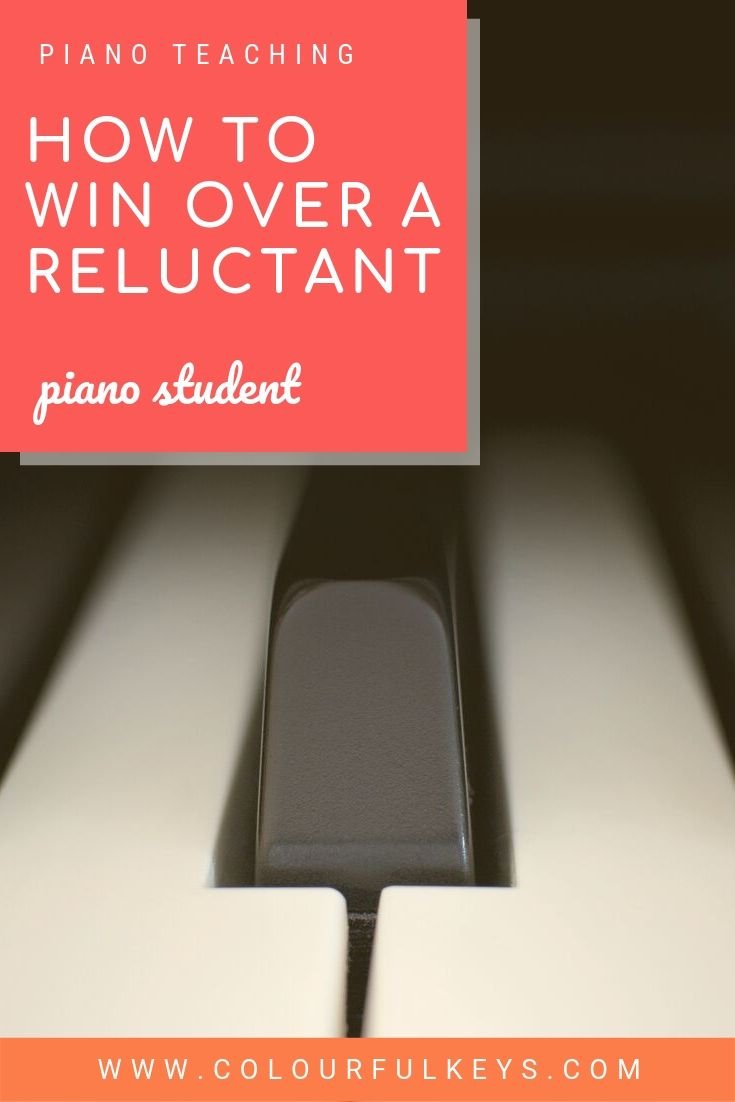Have you had a reluctant piano student? One who, for whatever reason, just did not want to be there?
If you’ve been teaching a little while you probably have. Sometimes it’s because students change their mind in the middle of the year and sometimes their parents essentially force them into lessons.

Whatever the reason, it’s never pleasant or productive to attempt to teach someone who doesn’t want to learn. And if you can’t or don’t want to kick them out of your studio, then you’re going to need to find a way to bring them around.
Find a Connection
The first thing you need is rapport. You’re not going to convince this kid that piano is a fun and awesome activity if they think YOU are lame.
This might mean that you allow a bit more chatting time in your lessons for a while.
Find out what the student likes doing and what their favourite subjects are in school. If you keep digging, you’re sure to find at least one point of connection.
Once you find your “in” you can start to bridge the gap between that and music.
- Show your student how music is mathematical if that’s how their brain works.
- Relate piano techniques to dressage moves if they love horse-riding.
- Explain the cultural context of each piece if you find out they’re into historical fiction.
At the very least you’ll show them that you care about them as a person, and that can make all the difference – no matter the age of the student.
Make it Relevant
The music, that is.
Find out what music they actually enjoy and teach them that. Depending on the genre, you probably won’t be able to keep this up forever, but in many cases, this will pave the way for other genres down-the-track.

Mix it Up
Keep ‘em on their toes! Don’t let them think that piano lessons are just the same old, same old.
Try starting each lesson with something different every week:
- Improvisation
- Theory games
- Composing
- Garageband
- Sight reading
- Note name challenges
- Pop chords
Really challenge yourself to try as many different things as possible and see what sticks. (Do it at the beginning of the lesson to increase the element of surprise.)
Tweak the Parent Involvement
Finally, flip the parent involvement level.
- If they’re currently staying far, far away from the practice room – get them in there every day.
- If they’re involved and enforcing practice at home and it’s just not working – take a no-practice approach for a while.
Everyone is different. Some need a lot of hand-holding and support, and others will feel stifled and rebel against too much control. This is different with different activities too, so it’s worth experimenting.
Have you won over a reluctant piano student in the past?
Share your success story below! It might help those who are currently despairing to know that there’s hope out there. 🙂

I have found a bigger percentage of boy students as they grow older seem to think of piano not very high high on their priority list of things to peruse.
Sports, video games, friends, and alot more homework in HS keeps them busy. I have offered more jazz to play, popular pieces, what ever they want to do. They want to memorize pieces so they can show friends their stuff.
So the usual method books go out the window at times. I still have lost a few to the outside world but the ones who stay have become amazing,.
I found there is a lot more catering to keep their interest and that’s okay.
Yes, we have to give them something to show off with! 😀
I tried most of those suggestions. She just loved to play Fur Elise (simplified), and that was it! I finally got her to learn Canon in D. But, she really hated piano. I tried improv, teaching chords to play lead sheets, fun songs, games. I had her for 3-4 years.
Sounds like you did everything you could. 🙂
I’ve found that I can win over the kids who can get to the piano at least 2-3 times per week. It’s a matter of figuring what music they like and giving them tools to learn that music so that they want to practice AND experience success at home. If practicing piano feels good, kids get hooked and 2 days of practice will likely turn into 6 days. Later on, I can make things harder and introduce other genres. Also, getting their friends involved is crucial! If friends know and expect that they can play cool things, then peer pressure makes piano part of their identity. Parents are an ally in all of this!
But if the kids are over-scheduled and can’t get to the piano, there’s nothing I can do. Because at the end of the day, the parents aren’t willing to be an ally.
Right, when some practice is happening it’s definitely easier.
I had a JH girl who seemed to be getting bored at home with practice. After discussing her outside activities, found out she horse back rides.
By the next week, I had found a sheet music piece about horses. That really worked!
She has worked very hard all last week on the new horse piece.
So happy!
Sometimes we just need an “in” with students! Horses, dinosaurs, basketball…whatever works!
I don t teach kids that won t practice
Well, this may seem funny but so far it has worked and I know only because one of my teenage boys told me so. That same teenager now has a PhD in theory and composition and he and his wife are Suzuki piano and violin teachers with a large studio. He said playing the piano in high school makes you a “chick magnet”. LOL. He realized the girls would go mad when he played at school and that made him want to play even more. So I always tell my boys that story when I see they are starting to like girls. Sometimes they get embarrassed but it gets them thinking about the importance of making music. Of course they have to be playing the latest songs or impressive sounding pieces so that’s what we start working on and they love it.
Haha, love it Tanya. Teaching them things their peers will find relevant is really the key here!